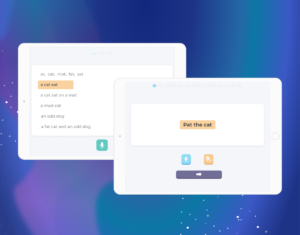
Is Gamification Effective in Learning to Read?
Gamification applies game mechanics to non-game environments, like education, to engage and motivate learners.
Welcome to our blog, a dedicated space where we delve into the world of dyslexia and reading acquisition. Our mission is to provide a guiding light for parents navigating the path to support their children, offering insights, support and resources to empower them on this transformative journey.
Struggling readers are not just statistics; they are unique individuals with diverse stories. Here, we explore the unique needs of these children. We believe it is essential to address the mental health aspects for dyslexic children, understanding that their challenges are not just academic, but emotional as well.
We want to create a space where parents and educators can come together to share experiences, strategies, and support for children with reading difficulties. Together, we can pave the way for a brighter future, where every child’s path to reading is met with understanding, compassion, and the tools they need to succeed.

Gamification applies game mechanics to non-game environments, like education, to engage and motivate learners.

The process of learning to read doesn’t begin with the alphabet itself, but is deeply rooted in the spoken language skills that children develop from a very early age.

In 2023, GoLexic received funding from the European Union, under the Women TechEU initiative. Let’s look back at what this initiative helped us accomplish in the last 10 months!

In the GoLexic reading programme, children strengthen their reading skills using decodable texts. How are these texts different from the texts usually used for reading instruction?

As parents, all we want is to equip our children with all the tools to grow up happy, and fulfilled. One of the most important of these is being a good reader. What we don’t often talk about is how children’s cognitive and social development benefits from the process of learning to read.

And even though learning to talk doesn’t require any literacy skills, learning to read and write requires language skills. In fact, oral language skills are key to strong literacy development. Research has shown that listening and speaking skills have a direct relationship to the skills needed for reading and writing.

A few decades ago, cognitive scientists compiled the research and identified five components of effective literacy instruction. This research is known as the Science of Reading.

Finding the right books for someone with dyslexia or reading difficulties can be a bit overwhelming. Luckily, we asked some parents about which books their dyslexic children enjoyed reading. Here are some of the books they recommend, listed by age group. Yes, that also includes some books to help you wrap your head around dyslexia. Take a look.

At Golexic, we believe that everyone, including those with dyslexia, can achieve success. That’s why we want to share with you the stories of successful dyslexic celebrities and reknown figures from time to time.

One interesting aspect of dyslexia is how it manifests itself differently in different languages. Bilingual individuals who speak more than one language can experience dyslexia in all languages.

Dyslexia is not only about struggles with reading. It can also often involve specific strengths or ‘superpowers’. And for inspiration, here are some jobs and careers in which dyslexics do particularly well.

While it can be a challenging journey for children and their parents, it is important to remember that dyslexia does not define a child’s potential or future success.